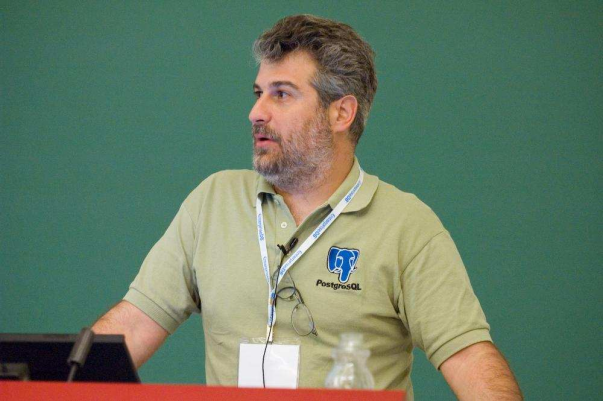
[CSDN Editor's Note] Since the advent of the first database management system IDS (Integrated Data Storage) in 1961, the development of the database has been more than 60 years, and countless outstanding people have made significant contributions to this, and Bruce Momjian, who has witnessed the development of the database, is also one of them. one. Bruce is one of the core authors of PostgreSQL and an advocate for the open source movement. But the early Bruce was not born in a class, and he didn't even have the slightest connection with the computer field. The reason why he has achieved these achievements is inseparable from his exploration for more than 30 years. "New Programmer 004" takes you into Bruce's programming life.
Author | Guo Lu editor in charge | Xu Weilong
Produced | "New Programmer" editorial department
As one of the core members of the PostgreSQL team, Bruce Momjian (hereinafter referred to as "Bruce") has been responsible for guiding the development and release of the PostgreSQL database for many years. In addition, he is also one of the advocates of the open source movement and has a pivotal position in the computer field. However, Bruce did not come from a computer background in his early years, but specialized in history. In the era when the computer was still in its infancy, he also admitted that "there is an element of 'gambling' to be associated with the computer."

Bruce's recent photo (picture from Bruce's personal blog)

Change majors several times for employment
Bruce was born in Philadelphia in the early 1960s. Like other American kids of the era, Bruce had an ordinary childhood. As a student, he found himself very interested in humanities and history, so he chose to major in history at university. However, although interest is the best teacher, the road to learning history is not as easy as he imagined. On the one hand, studying history does not mean that you can do research in the future; on the other hand, it is not so easy to find a job in American history majors. So after two years of studying, Bruce decided it was time to switch paths.
At first, Bruce found that being a teacher seemed more promising, so he switched to mathematics pedagogy, preparing to teach after graduation. But mathematics is really very boring, so I began to wonder if there are other fields that are more suitable for me. By chance, Bruce learned about the emerging field of computing.
At that time, the development of the computer field was only a decade or two, so choosing a computer was a bit of a gamble. But in his view, the computer belongs to the field of the future, and it has the opportunity to influence the world in the future. After seeing this clearly, Bruce began to devote himself to the study of computer knowledge. Although he didn't come from a professional background, after coming into contact with computers, he quickly realized that this was the direction he really wanted. Through self-study, he has a considerable understanding of computers. After graduation, he successfully became a computer teacher in many high schools in the United States. What he didn't expect was that this was just the beginning of his fate with the computer.
Bruce did not stop exploring the computer field during his teaching period. According to his recollection, after getting started, he has learned many "long-term and practical core technologies", including Unix, C language, HTML, operating system knowledge, virtual memory management and assembler that appeared in the late 1960s. and many more. This also laid a solid foundation for him to really enter the computer field.
In 1989, after being exposed to databases, Bruce became a database consultant, building specialized database software for many law firms, and this job also gave Bruce his first exposure to SQL databases. It was during this period that he firmed his direction to specialize in databases. At that time, the database had a history of nearly three decades, and database management systems such as IDS (Integrated Data Store), IMS, and Oracle were all developing rapidly. In order to adapt to this wave of development, Bruce has intensively studied related knowledge such as Ingres and Informix. And wrote shql in 1992, and implemented SQL through Unix shell scripts.
In 2000, Bruce discovered Postgres by chance and became a part of it, which became the biggest turning point in his career. Six years later, Bruce and team members co-founded the PostgreSQL community, and continued to contribute over the next two decades, managing the community and blog on the one hand, and developing and maintaining the database on the other. At the same time, he is also a staunch evangelist of PostgreSQL, often giving public speeches around the world to expand the influence of PostgreSQL.
It can be said that after joining the Postgres team, Bruce dedicated all his energy to Postgres. Under his efforts, Postgres has gradually evolved from a fringe academic project into a database with great commercial value. PostgreSQL is powerful and can adapt to almost all database scenarios, so it is welcomed by major companies around the world. And behind this achievement, Bruce can be found.

Bruce's recent photo (picture from Bruce's personal blog)

"As long as 95% of users' needs are met"
The New Programmer: The PostgreSQL community has been established for over 20 years, and in my impression, it is the oldest database community in the world. So what changes have occurred in the PostgreSQL community in different times?
Bruce: Created in 1986, PostgreSQL is an extensible relational database that can meet many new needs. In the last 20 years of its creation, this feature has not been put to good use. However, after the continuous development of this industry, people's demand for data has changed a lot, and the application scope of PostgreSQL has also changed.
In the 1990s, most data input and output used simple terminals or APC analog terminals. However, after this, Internet technology is facing great innovation. Not only do we have technologies like the Internet of Things, GIS (Geographic Information System), and GPS, but we are also able to acquire data, store data, and export data. At the same time, due to the emergence of data warehouses, data analysis has become more and more important.
Given these changes, if the database cannot scale, there may be many problems because we need to analyze complex data.
"New Programmer": In the past 2 years, how have people's needs for databases changed? What does this mean for cloud-native developers?
Bruce: It's hard to say, because our project has been around for 35 years, and we rarely think about the past in two-year units, but we do have a lot of room for improvement.
For example, with today's growing demand for data encryption and security in companies, we didn't expect ransomware in the past. Many companies, especially large ones, are suffering from severe ransomware attacks. So people increasingly expect us to have security features. In addition, in the past two years, massively parallel processing capabilities and security issues may be more important development directions.
New Programmer: In database applications and database systems, the focus is on how data is stored and how quickly it can be retrieved, so how do we do that?
Bruce: PostgreSQL is a general-purpose database, so its focus has never been on achieving 100% compatibility. We can provide performance optimizations for developers to meet 95% of their needs, but if we need to meet the remaining 5% of needs, we may need to put in 10 times more effort than before.
In general, PostgreSQL, as a general-purpose database, can do a variety of common tasks. And if you need some special functions, you can add a database and integrate the two databases. People are often upset that we don't have those bells and whistles, but just because we don't have them, the user doesn't need to optimize them either. We don't want to complicate PostgreSQL and make developers face even more serious problems.
Fortunately, with the advent of cloud technology, we have been able to continually test our ideas. People might say that if the software is too slow, they will choose to change a few parameters. But if it's too slow, we'll build a bigger server in the cloud instead of spending a week setting up parameters to meet the remaining 5% of performance.

"Academia should embrace new technologies of open source"
"New Programmer": In the current cloud era, if you want to work in data, how should you plan your career path?
Bruce: I think the most important thing for students is whether what they learn in school matches the current industry. Nowadays, there are more and more channels for obtaining data, including mobile terminals, clients, browsers, and GIS. Developers must understand these in order to better understand the database. For college students, I think they all need to pay more attention to market needs, learn open source knowledge and join open source communities. So I want academia to embrace new technologies and bring them into universities.
"New Programmer": What advice do you have for Chinese developers?
Bruce: In the past 4 years, there have been more and more Chinese developers using PostgreSQL, which was unimaginable in the past. China has more opportunities to participate in this global process and make achievements. The Internet has opened the door for us to communicate, and opportunities that were previously only available in developed countries are now available in any corner of the world. Therefore, Chinese developers can achieve real success by constantly learning new technologies.
【References】
https://momjian.us/download/shql.1.3.README
https://momjian.us/main/faq.html
http://lorance.freeshell.org/shql/
https://en.wikipedia.org/wiki/PostgreSQL#History
https://postgresql.life/post/bruce_momjian/
This article is from the upcoming "New Programmer 004", a dialogue with world-class masters, and a report on the innovation and creation of China's IT industry!

— Recommended reading —
☞腾讯被曝要求员工还清90万房贷再离职;苹果因不附带充电器被判赔偿消费者7000元;Git 2.6发布|极客头条
☞《程序员延寿指南》登GitHub热榜,最多可增寿20年?
☞霸榜 GitHub 热门第一多日后,Colossal-AI 正式版发布—Click here↓↓↓ Remember to pay attention to the stars~-
"Share", "Like" and "Watching" with one click
Achieve 100 million technicians
